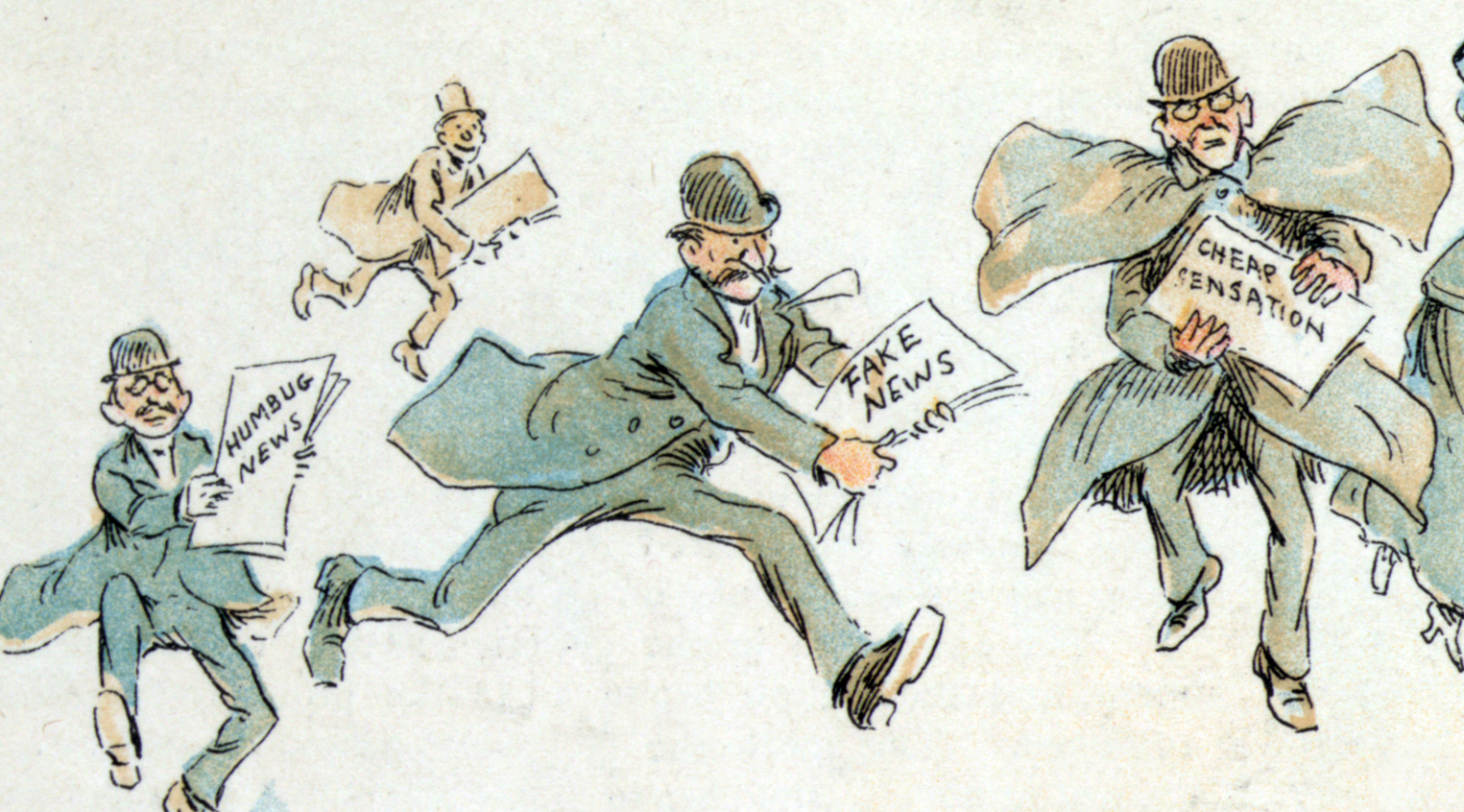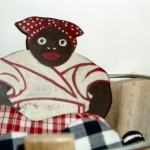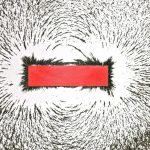Firstly, I have to admit, that all those ideas do not belong only to me, but also to other people who took part in a roundtable on fake news in French Institute “Human and Social Sciences in The Post-Fact Era”[1] on January 25th and in a later discussion. Therefore, I would better avoid calling myself a fully legitimate author, but partially a mediator of ideas which were born in the course of discussion few months ago.
Recently, Russia is becoming quite famous in discussions on fake news, so I will start with the Russian fake news which was aired on state owned channel Russia24 in November last year. The news was claiming that the coalition of troops led by USA undisputedly supported ISIS troops in Syria. TV presenter claimed that according to the information of the Russian Ministry of Defence there is an irrefutable evidence of the link between the coalition and terrorists, both of them Russians had to fight. The evidence was a video taken by Russian remote-pilot vehicles near Abu Kemal. What we could see on this video is several tracks moving on the road, which allegedly lies on the border between Iran and Syria.
Two things were weird about this news: first is that Syria and Iran do not have a mutual border, second, the video was taken from the video game AC-130 Gunship Simulator. This led to an endless chain of jokes using all kind of games. Russians were twitting shots from games and making news from them: suddenly, the conquest of a castle in Heroes of Might and Magic became an evidence of a conflict between USA and Russia over Alaska territory and shots from Black Mesa became an unconditional testimony of Russian soldiers’ glorious fight with ISIS terrorists. Frame analysis combined with a pinch of artistic critique could have explained the event perfectly, but at this point I would prefer to say some words about the nature of fake news, knowledge, and the role of practice in academia.
Fake news led to distinct reactions, the most interesting for me were those claiming that even if the news was an obvious lie, people would still believe that USA and ISIS are allies. “Belief” – this is the key word that has to be understood in relation to the phenomenon of the fake news. As Ondřej Švec from the Institute of Philosophy and Religious Studies correctly emphasized in the roundtable, the fake news is a symptom of a bigger problem. The actual problem is a crisis of systems of knowledge and truth production, which each society created and now nourishes and cherishes. These systems are namely education, medicine, and state administration; in other words all systems which are based on expert knowledge. Švec claims that the truth-production infrastructure (based on consensus, but not on a “given” truth) is losing credibility and becoming substitutable with other dispersed systems of truth production. These new systems are alternative media and individuals themselves in a moment of posting hypothesis of Jiří Drahoš being a paedophile on their Facebook pages. So-called truth became scattered, diffused, everyone can create and grasp it. The question we have to pose is: is this dispersion a symptom of crisis or emancipation?
An important thing that has to be understood, in my opinion, is that we are not speaking about the truth, but the belief as was already mentioned above. Fake news brings doubt into the knowledge and this is its main function. It does not make another type of knowledge as some authors claim (Ylä-Anttila 2018), it degrades almost every fact to the level of credence. Belief, as some Greek philosophers claim, differs from knowledge because it can never be certain. Belief is a cognitive format that manages the action, while knowledge brought up by pure philosophy is something that cannot have any connection to experience. Dewey (a quite important inspiration for the pragmatic turn) was critical to this standpoint: knowledge and action according to him can hardly be separated. He calls philosophy an intelligently directed action (1998 [1929]: 104), because it serves to protect the security of values. Other types of knowledge, beliefs and actions serve the same function. Everything that individuals are doing and thinking is targeted towards one goal: to make the reality more certain and to protect value systems on which social world is based.
As one of the scholars, involved in the debate that took place after the roundtable, pointed out, content, producer and presumable audience of the fake news deserve more attention than speculation about its truthfulness. Indeed, why do we have to discuss the truthfulness of knowledge if we already stated that we live in post-fact, post-truth hyperreality arising again and again in endless circles of simulation? This question leads to several implications.
Firstly, when we speak about the content and audience, it is quite easy to make a connection between people who were voting for Miloš Zeman or Donald Trump in last elections and recipients/creators of the fake news. This group of people (excuse me for re-creating a category of white angry men again and with no reflection, but some reduction has to be made for the sake of a clear argument) probably sees all the systems of truth production as useless because this exact truth does not bring anything to them. No profit, no voice, no confidence. Why do they need it then? Especially in the Czech Republic at the time when the liberal consensus is falling apart (Holubec 2015) and it turned out that reforms were anything, but a miracle. Knowing that, as Dewey might have noticed, does not make any sense for those people. And therefore there is a question why do they need this kind of truth, if they can possess another one which will persuade them that women, migrants and Mexicans are foes and “they” are the big, pure nation/holders of better, clearer knowledge (which others in disgust call “conspiracy”). Fake news therefore is a slap in the face of truth-producers who failed to bring certainty to the people who are looking for another type of knowledge which serves this function.
Russian fake news is a good example, but one of another type. At the time of people’s powerlessness, recipients might be strongly dissatisfied with a state of political freedoms and economy and therefore believing in the victory over USA appears to be a pleasure. This belief can make people feel related to the state and perceive its strong power. However, the producer of the fake news in mentioned case was the Russian state, but not just somebody writing posts of Facebook. I leave the propaganda topic for another discussion, I find it necessary to underline that state authorities hold the power over the knowledge production (fake or not) tightly: therefore it is hardly possible to speak about such a strong dispersion of truth production as was discussed in the roundtable. This is happening due to several reasons, including aversion to politics and television in general (which is not happening in all classes: for majority television remains the only source of information (FOM 2017)). The managerial class, as recent research showed, turn their back to Russian television due its stereotypical, predictable content which causes the feeling of devastation (Platforma 2017).
Secondly, we have to discuss the usurpation of truth by academia. With all my respect, four white male academics discussing the problems of truth invoke a question about the usurpation of truth by certain groups of people. What was not clearly articulated, but certainly was present in the roundtable among engaging speeches on the crisis of truth and epistemological populism, was a feeling that academia is one of the systems of truth-production which is separated from all others and is still able to produce a critical knowledge. With regard to all what was said, we can presuppose that the practice of academic knowledge should be radically changed in order to call this knowledge emancipatory. As Jana Bacevic correctly noticed (2018), there is a paradox in academic knowledge which has a power to criticize, but cannot implement its critique in the academic terrain. Švec pointed out that we need new paradigm which will combine the old and new problems, objects and subjects. We might supplement this amazing notice with the practice which will correspond to the critical knowledge we have. Without this practice and physical, material engagement in the academia and outside, words of critique make less sense.
Taken all things together, we can say that the fake news is of paradoxical nature. On the one hand, it puts strong limits to emancipation because it breaks the truth into the pieces (which reduces collective action), escalates conflicts, strengthen stereotypes and one might even say that it limits the access to the reliable information which is needed for the democratic action. On the other hand, the fake news is a symptom of a process when certain groups of people usurped the truth, got stuck in flows of its production and formal evaluations and left behind the ethos of intelligently directed action and the role of knowledge in uncertainty reduction. As a result for the less socially and financially protected groups (and not only) the fake news acquired a clearer social function than the academic truth. So does the fake news put a limit on emancipation or is it a new chance to re-interpret the role of knowledge and make it more emancipatory?
Sources:
- Ylä-Anttila, T. 2018. „Populist knowledge: ‘Post-truth’ repertoires of contesting epistemic authorities“. European Journal of Cultural and Political Sociology 20(9): 1-33.
- Dewey, J. 1998 [1929]. „Philosophy’s Search for the Immutable. From The Quest for Certainty” in L. A. Hickman and T. M. Alexander (eds.) The Essential Dewey. Pragmatism, Education, Democracy. Bloomington-Indianapolis: Indiana University Press.
- Platforma. Centr Social’nogo Proektirovanija. 2017, January. Issledovanie PoliticheskoeTelevidenie[online]. Moscow [cit. 3.3.2017] Available online: http://pltf.ru/2017/02/01/polit-tv/
- FOM. Fond Obshhestvennogo Mnenija. 2017, May. Instochniki Informacii: Monitoring [online]. Moscow [cit. 3.3.2017] Available online: http://fom.ru/SMI-i-internet/13323
- Bacevic, J. 2018, February 7. „The Paradox of Resistance: Critique, Neoliberalism, and the Limits of Performativity”. Internal Conversation, Eternal Emigration [online] [cit. 3.3.2017]. Available online: https://janabacevic.net/2018/02/07/paradox-of-resistance-critique-neoliberalism-and-the-limits-of-performativity/
- Holubec, S. 2015. The Formation of the Czech Post-Communist Intellectual Left: Twenty Years of Seeking an Identity in M. Kopeček and P. Wcislik (eds.) Thinking through Transition. Liberal Democracy, Authoritarian Pasts, and Intellectual History in East Central Europe after 1989. Budapest-NY: CEU Press.
Footnotes:
[1] The whole video record of the conference could be found here: www.youtube.com/watch?v=Zu0O-l52Z4c






